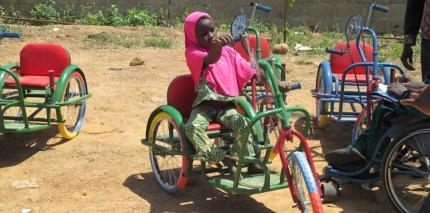Entering through the Beautiful Gate

Young girl rides in a wheelchair provided by the Beautiful Gate.
World Renew
Suffering from the effects of childhood polio but determined to push himself along the ground with his hands, Ayuba Gufwan was able to make his way to the church in his Nigerian village one day.
But someone standing outside the church turned him away, he said, telling him no beggars were allowed inside.
Painful as it was, rejection like that was not new, said Gufwan during a recent presentation, coordinated by World Renew, in which he talked about his childhood as well as how as an adult he has begun an ongoing ministry to people who are disabled in Nigeria.
“That experience at church infuriated me, but things like that happened to me many times,” Gufwan said to a group gathered at the Grand Rapids, Mich., offices of the Christian Reformed Church.
“When I was born with polio in 1972, it was a devastating experience for my family,” said Gufwan, who grew up in Plateau State in Nigeria.
He was confined at home most of the time. Even when he went out to play with other children, he couldn’t keep up with them because he had to walk on his hands. “Polio put the brakes on my life and my hopes and dreams.”
But, he said, a meeting in 1999 at a religious education conference with Ron Rice, a retired Presbyterian pastor from Seattle, Wash., turned his life around. Rice spent many months each year in Africa, working with people who have disabilities.
The two became friends and eventually began a ministry to provide specially designed wheelchairs for polio survivors.
As they launched their ministry and needed a name for it, Gufwan said, he thought back to the experience of being told he couldn’t go into the village church.
He also thought of the story in Acts 3 about a man who was lame from birth and was begging at the “gate called Beautiful” just outside the temple in Jerusalem as the apostles Peter and John approached.
Peter looked the man in the eye and said he couldn’t give him money but instead healed him in the name of Jesus as he reached out his hand and helped the man to his feet. Then the healed man went with them into the temple, praising God.
“I had not been much different from that gentleman in
Acts,” said Gufwan. “I remembered reading that story in the Bible, which reminded me I’m a child of God.”
And so, he said, he decided to call their ministry the Beautiful Gate Handicapped People Center. Located in Jos, Nigeria, the shop employs polio survivors and others who build pedal-powered tricycles that serve as wheelchairs.
So far, the ministry has built and donated thousands of wheelchairs, far more than any other organization in Nigeria. They have given away wheelchairs in 23 of Nigeria’s 36 states to churches, schools, universities, colleges of education, government offices, mosques, and many other places.
“This ministry has allowed us to open doors and reach out to many people, including Muslims who wouldn’t have experienced a Christian influence in any other way,” said Gufwan.
With the support of World Renew and other organizations, Beautiful Gate has also developed a prosthetics shop to make artificial legs, and has given out hundreds of crutches and many folding white canes to blind students at the University of Jos and several schools for the blind.
As part of its support for the program, World Renew helps provide services so that people with disabilities can learn to value themselves and see their potential.
“I’m grateful that we have been able to do this. So many others have been able to use the wheelchairs to go back to school, to get a job,” said Gufwan.
Despite his challenges, with the help of a wheelchair that his uncle gave him when he was 19, Gufwan was able to attend school and eventually go to college and to graduate from law school.
He also met and married his wife, and they have four children.
Having accomplished much himself, he is motivated to help others.
“I know that if you’ve been affected by polio or any other crippling disease, a wheelchair can restore hope and turn around your life,” he wrote in an article for the Bill and Melinda Gates Foundation, which helps support Wheelchairs for Nigeria, another part of the Beautiful Gate outreach.
In 2015, said Gufwan, Nigeria recorded no cases of polio — a first. But there is still work to do until polio is eradicated for good and all survivors are given the services they need.
In a question-and-answer session after his presentation, Gufwan was asked if his organization has expanded into such other countries as Afghanistan and India, where people remain at risk for polio.
“We have been able to see some work done in other countries,” he answered. “But there is still so much to do. We have merely scratched the surface in Nigeria.”
The continued work of Beautiful Gate is made possible through the generous support of the Manitoba Council for International Cooperation (MCIC). MCIC is providing two years of funding to Beautiful Gate through World Renew's partnership with a Nigeria-based organization that serves the needs of people with disabilities.


